Jones the Brave
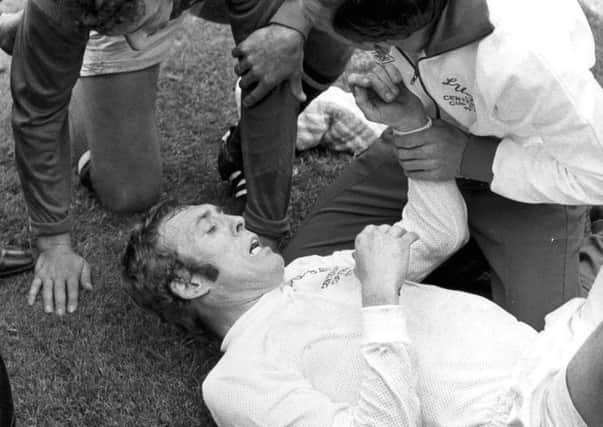

‘I’ve heard that some people watching the game on television were physically sick when they saw the injury,’ he recalled.
The team doctor tried to persuade him not to trudge up the steps and collect his medal, but he was determined to make the climb. After the victorious Leeds players went ahead of him, Jones took each step gingerly with his arm crudely strapped with bandages to his side and team-mate Norman Hunter guiding him along.
Advertisement
Hide AdAdvertisement
Hide AdThe Duke of Edinburgh asked if he was OK, but to Jones’s dismay the Queen said she had given his medal to another Leeds player. Once back on the Wembley turf, Jones was whisked off to the dressing room. After around three quarters of an hour, four doctors appeared. Each one held his left arm in a strategic position, then slotted the elbow back into position with him writhing in agony.
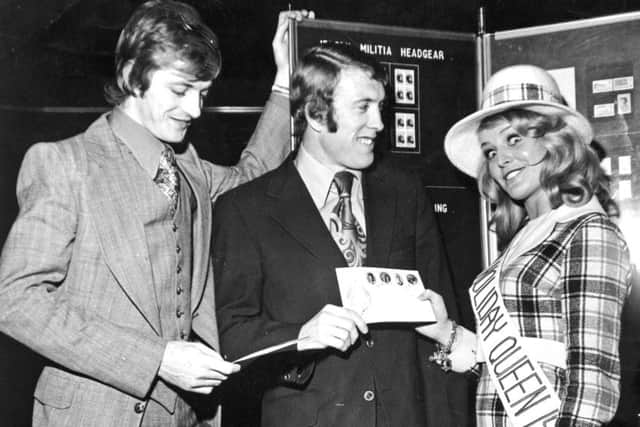

Each day over the ensuing three months, he had treatment at a Leeds hospital, and he recovered sufficiently to play a part in the team so successful in the ensuing season.
Jones was born in Worksop in 1945, the son of a Steetley colliery miner who encouraged him throughout his career. He displayed early promise as a footballer and regularly, from the age of six, accompanied his father to watch both Sheffield Wednesday and Sheffield United.
To begin with, he played as a centre half, though when attending Worksop Priory senior school became more comfortable at centre forward. By his own admission, he was interested in nothing at school apart from sport. He turned out for Worksop boys and Nottinghamshire boys and when only 14 had trials with West Bromwich Albion, although they came to nothing.
Advertisement
Hide AdAdvertisement
Hide AdLeaving school at 15, he found work at Worksop’s Carlton Cycle factory, undertaking a variety of duties. While playing with Dinnington Miners’ Welfare , he was recommended by a Sheffield United scout for evening training sessions at the club, then in the old First Division. After about a month, he appeared in a side at Bramall Lane that lost 6-4, with him scored all four goals for the losers.
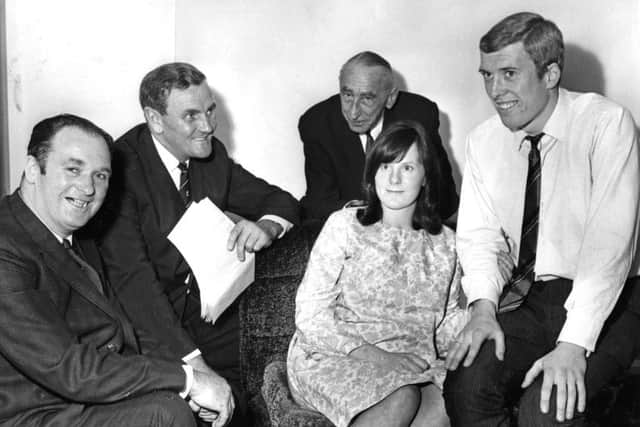

Afterwards, he was approached by assistant manager Archie Clark who offered him an apprenticeship with the Blades.
Several days later he left the factory job where he had spent ten months and started at Bramall Lane one Monday morning in April 1961. Among the other apprentices who were there or joined him later were Len Badger, Bernard Shaw and Alan Woodward. They, too, were destined to become Sheffield United stars.
Jones quickly found the net for both the junior and reserve sides and made his first team debut against Manchester United at Old Trafford on April 20 1963, four days before his 18th birthday.
Advertisement
Hide AdAdvertisement
Hide AdHe did not score in that game, which ended 1-1, but he fired in two in the next match against Manchester City at Maine Road and thereafter he was a regular in the side managed by the well-liked John Harris.
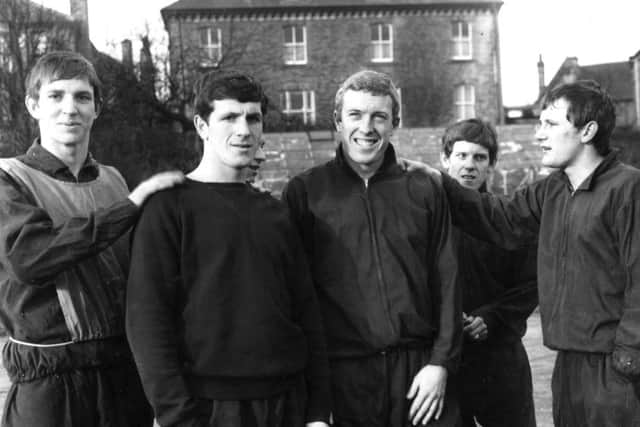

While at Sheffield United Jones also played nine times for the England under 23s and twice for the full England side, against Sweden and West Germany.
In September 1967. Blades supporters heard Jones was to be transferred to Leeds United and staged a protest outside the ground.
“On Friday September 22, 1967, I remember training alongside club legend Joe Shaw and he said: ‘You’ve got a chance to join Leeds United and earn £60 a week’. We were on £35 a week at that time. After training I went to see John Harris and asked him what it was all about. He was non committal but telephoned chairman Dick Wragg, asking him to tell me what was happening. When Wragg appeared he told me everything would be revealed very soon.”
Advertisement
Hide AdAdvertisement
Hide AdLater that day, on returning home from a supermarket shop with his wife, Jones was surprised to find Leeds manager Don Revie, and the Leeds chairman on his doorstop along with a Press reporters and photographers.
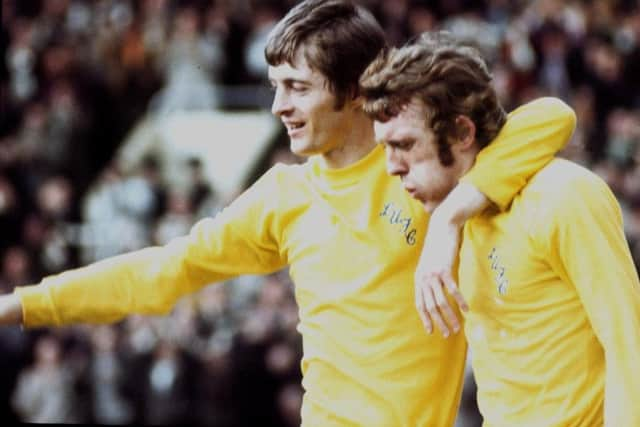

Revie approached Jones, who was carrying the week’s groceries, and said: “We want you to sign for Leeds United.”
Details were finalised and within minutes Jones was a Leeds United player, the club paying £100,000, a record for both clubs.
The thought of moving had never occurred to him. He was happy at Bramall Lane and genuinely grateful to the club for giving him a big chance.
Advertisement
Hide AdAdvertisement
Hide AdEventually, he was to discover that over the previous two years a number of London clubs as well as others in the North had been keen to sign him.
“I was sorry to leave Sheffield United,’ said Jones, “and know that John Harris was deeply upset to see me go. In fact he nearly resigned over the issue.” At Sheffield he played in 149 league matches, scoring 63 goals.
At Leeds, it took a while before he bonded with a team full of internationals. On finding his goal- scoring form he became a crowd favourite, particularly when a lethal partnership was formed with inside forward Alan ‘Sniffer’ Clarke.
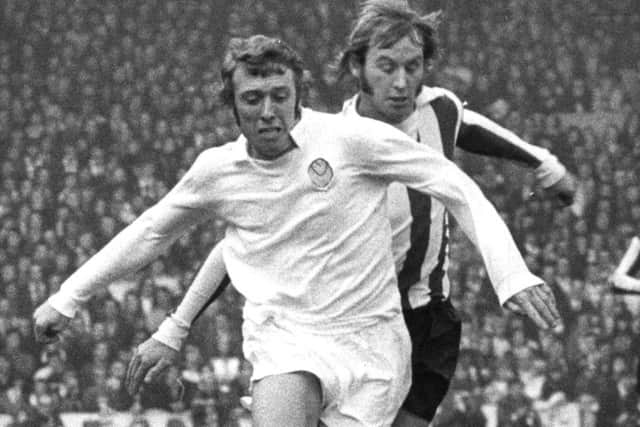

His souvenirs from his Leeds days includes medals from winning the Football League First Division, twice; the FA Cup; Football League Cup; FA Charity Shield; and the Inter-Cities Fairs Cup, twice.
Advertisement
Hide AdAdvertisement
Hide AdRevie called him the bravest and most dedicated of professionals: a player whose contribution to Leeds’ success cannot be measured in goals alone, but also in his selfless running to make opportunities for others.
A serious knee injury cut short his career in 1975. For Leeds he made 219 League appearances and scored 77 goals. Leaving the game, he was a representative for a sports company for ten years and then ran his own sports shop for a further 15 years.
Until recently, he was a Leeds United ambassador.